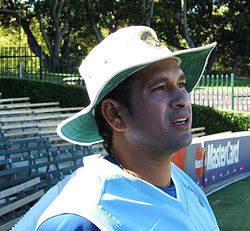- India's Sachin Tendulkar was the tournament's top-scorer with 673 runs.
- India captain Sourav Ganguly was the second-highest run scorer in the tournament.
- Australia captain Ricky Ponting scored 415 runs in the tournament.
- Australia's Brett Lee was the tournament's second-highest wicket taker.
- Andrew Symonds played two important innings, each against Pakistan and Sri Lanka, to lead Australia to victory.
 | |||||||||
| Event | 2003 ICC Cricket World Cup | ||||||||
|---|---|---|---|---|---|---|---|---|---|
| |||||||||
| Australia won by 125 runs | |||||||||
| Date | 23 March 2003 | ||||||||
| Venue | Wanderers Stadium, Johannesburg | ||||||||
| Player of the match | Ricky Ponting (Aus) | ||||||||
| Umpires | Steve Bucknor (WI) and David Shepherd (Eng) | ||||||||
| Attendance | 34,000 [a] | ||||||||
← 1999 2007 → | |||||||||
The 2003 Cricket World Cup Final was a One Day International (ODI) match played on 23 March 2003 at the Wanderers Stadium in Johannesburg. It marked the culmination of the 2003 Cricket World Cup, the eighth edition of the tournament. It was the first time these two teams had met at this stage of a World Cup. For defending champions Australia it was their fifth World Cup final, while for India it was the second after their 1983 victory. Australia won the match by 125 runs to claim the title for the third time.
Contents
- Background
- Format
- Squads
- Route to the final
- Group stage
- Super Sixes
- Semi-finals
- Build up
- Match details
- Match officials
- Summary
- Scorecard
- Aftermath
- See also
- Notes
- References
- Sources
- External links
Both teams had progressed through three stages to reach the final. Australia was unbeaten thus far, while India had lost one game—against Australia in the first stage. Australia—led by Ricky Ponting—entered the game as firm favourites. After winning the toss, India captain Sourav Ganguly decided to field first. The Australian opening pair, Adam Gilchrist and Matthew Hayden, added 105 runs in 14 overs. After their dismissals, Ponting (140 not out) and Damien Martyn (88 not out) were involved in a partnership of 234 runs, then an Australian record, and took the total to 359 runs for 2 at the end of the innings. Harbhajan Singh took two of the Australian wickets, conceding 49 runs.
In response, India lost their key batsman, Sachin Tendulkar, at the start of the innings. Despite a brief interruption by rain after the 17th over, no time was lost from the game. Once play resumed, India lost wickets at regular intervals. Virender Sehwag top-scored for India with 82 runs, before the team's innings ended for 234 all out in the 40th over. For Australia, Glenn McGrath took three wickets for 52 runs, while Brett Lee and Andrew Symonds claimed two wickets each. Ponting was named man of the match for his 140 not out, and Tendulkar, the tournament's leading run-scorer (673 runs), was awarded the man of the series. The final was Australia's seventeenth successive ODI win, a record, and they were the first team to win three World Cups. Ganguly's decision to bowl first in the match was criticised by journalists and former cricketers.




